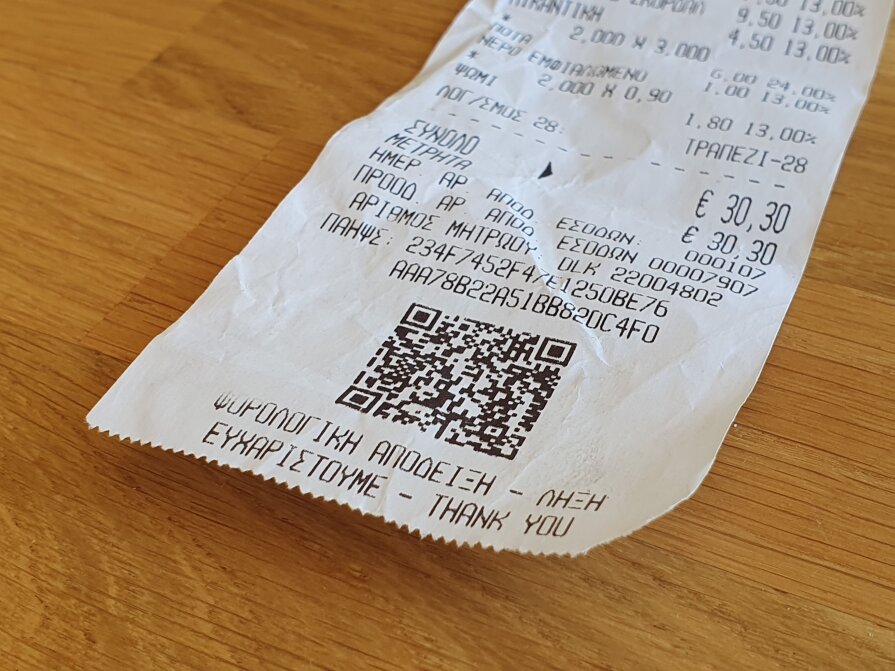Exploring Greece's innovative fight against tax evasion: QR codes, snitching apps, and VAT lotteries
Macedonia, the northern part of Greece, offers a beautiful green landscape with a crystal clear Mediterranean Sea. But that is not the only thing that I find interesting. After spending a couple of days here and visiting some local restaurants and coffee shops, the QR code printed on every receipt got my curiosity. Let’s find out how the Greek are fighting tax evasion.
 Example receipt with QR code
Example receipt with QR code
Tracking every transaction
Scanning the QR code points you to a URL (example from below) of the Independent Public Revenue Authority (AADE). Surprisingly, this page contains all the VAT details about that particular purchase, which is submitted electronically in real time by the merchant. The amount per tax rate and even the amount of liters and type of petrol if it is a fuel purchase. By scanning this QR code, the customer can therefore know for sure that VAT has been paid.
I have some mixed feelings about his type of control. From a taxpayer perspective, it is genius to have such a system in a country that suffers from tax evasion and corruption. You are 100% sure that the taxes you are paying will be received by the tax authority and do not end up in the pockets of the merchant. But it is no guarantee that it will be invested in the country itself.
Moreover, tracking every purchase that is being made in an entire country leads to extra data points that might violate privacy when combined with others. Known as the Background Knowledge Attack: “Oh, we saw you go to the hospital. We found only one cash payment with the amount of the price of an STD test at the moment you left.”
 Miniature roadside chapel in Chalkidi region
Miniature roadside chapel in Chalkidi region
Snitching app
Why would the average tax payer care about this QR code if he or she could also benefit from tax evasion? Agreeing on a cash deal might benefit the customer significantly, as the VAT rate in Greece is quite high compared to other European countries (24%).
The tax authority has run a campaign (even at airports aiming for tourists) to call for refusal to pay if no valid receipt is issued1. Furthermore, they introduced an app called Appodixi, which can be used to verify receipts. But this app has one very interesting gimmick: if you scanned an invalid receipt, you can report it directly to the tax authority from within the app. If it turns out to be tax fraud and the merchant gets fined, you will get a reward up to 10 times the value of your receipt with a maximum of 2000 EUR2.
The VAT lottery
But there is more! Apparently, there exists such a thing as a VAT lottery. Basically, every resident in Greece is taking part in a lottery when paying for goods and services by debit or credit card.
Every euro spent anywhere in the country is a ticket in the lottery. By the end of each month, 1000 residents will win the VAT lottery and receive a prize of 1000 EUR in their bank account, costing the government 1M EUR per month in prize money.
When I heard about this, I first thought it was a joke. But this is apparently something that is also implemented in Malta, Portugal and Slovakia3. It has a couple of benefits: you need to pay by card, which makes it harder to evade tax by the merchant. You won’t be taking part in the lottery if you spend your unreported cash. Moreover, spending more will increase your chance of winning, which might be a stimulus for the economy as a whole.
Final thoughts
It is interesting to see that these entertaining ideas are actually viable. Maybe it is also cultural difference, but I think that if someone comes up with the idea of a VAT lottery in a more economically stable country, there is no chance that this will get enough support. Why would you reward someone who is doing their duty by paying their taxes?
Furthermore, I have no idea about the effectiveness in terms of the whole economy. It could be the case that large scaled corruption still happens and this only affects simple merchants and everyday people.